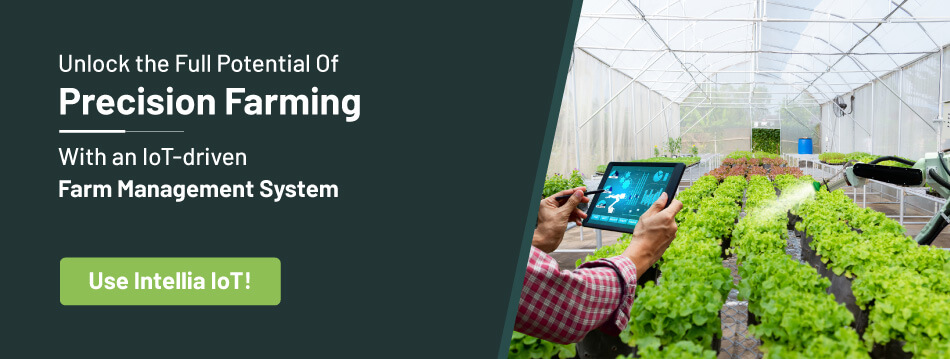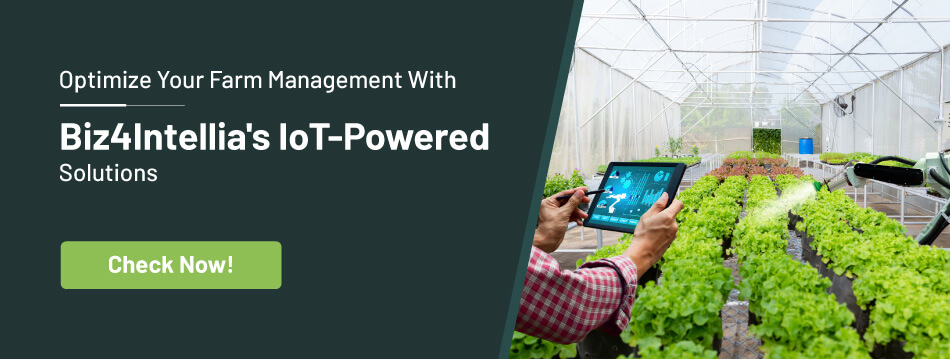The UN estimates that the world's population will reach 9.7 billion by the year 2050, causing a significant increase in global agricultural production by approx. 69%. Agriculture companies and farmers are switching over to IoT for better analytics and quality production to compensate for the increasing demands.
IoT comprises advanced tools, systems, equipment, and solutions that help improve overall yield in farms. It minimizes energy waste with real-time data collection, data storage, data analysis, and platform development.
One of the major reasons why IoT implementation is increasing in the agricultural field is the efforts and acceptance of various governments across the world to increase quality production.
Later in this article, we’ll explore how a smart IoT solution can improve farm management.
For starters, let’s understand the current challenges in farming.
Farming Challenges

The agricultural sector faces significant challenges which impact its productivity and sustainability. Some common ones affecting agriculture are:
1. Labor Shortages
The farming industry faces a significant challenge of labor shortages, primarily due to a diminishing supply of available agricultural workers. This poses difficulties in finding and retaining a skilled workforce to meet the demands of farm operations.
2. Climate Change
Changing weather patterns and extreme events like droughts, floods, and heat waves pose a major challenge to farming. Unpredictable weather conditions disrupt planting and harvesting schedules, affect crop yields, and increase the risk of pests and diseases.
3. Rising Costs
Farmers contend with escalating costs of inputs like seeds, fertilizers, machinery, and fuel. Fluctuating commodity prices and increasing regulations further strain profitability, making it challenging for farmers to sustain their operations and invest in modern technologies.
4. Access to Land and Resources
Limited availability of farmland, high land prices, and competition from non-agricultural sectors make it difficult for new farmers to enter the industry. Additionally, access to water resources for irrigation purposes is becoming increasingly scarce, particularly in arid regions.
5. Technology Adoption
While technological advancements offer opportunities for increased productivity and efficiency, the adoption of new technologies in farming can be a challenge. The cost of implementing and maintaining advanced equipment, as well as the need for training and technical support, pose barriers for many farmers.
It's time to get rid of these farming challenges by adopting Smart Farming!
Wanna know what is it?
Let’s get started.
What is Smart Farming?
Smart farming represents a transformative approach that combines technology, data analytics, and automation to optimize agricultural practices and improve overall efficiency.
It leverages advanced sensors, drones, IoT devices, and AI-powered systems to monitor and manage farm operations in a precise and data-driven manner.
With automated systems you can control irrigation, monitor livestock health, and optimize feeding schedules, ensuring resources are utilized efficiently.
In the realm of smart farming, every aspect of the agricultural process is interconnected and optimized.
- Soil sensors provide real-time data on moisture levels, nutrient content, and pH, enabling farmers to tailor their irrigation and fertilization strategies accordingly.
- Drones equipped with imaging technology capture aerial data, allowing for early detection of crop diseases, pest infestations, and plant stress.
- The utilization of data analytics empowers farmers to make informed choices, optimize yields, reduce costs, and minimize environmental impact.
The overarching goal of smart farming is to maximize productivity while conserving resources, enabling sustainable agriculture for future generations.
IoT Use Cases in Farming

The farming industry is eventually becoming more important with the advent of the IoT technology. Smart farm management system is re-creating how farmers can plow, harvest, and maintain crops.
Moreover, the idea of transforming farms with smart farm management is flourishing with smart IoT concepts. The farmers can track crop growth in real-time and keep a record for future analysis. This maintains the crop quality and suggests the requirements for healthy plant growth.
Let’s know the concept in depth:
1. Precision Farming
Farmers, with the help of IoT, can employ high-tech farming techniques and smart solutions to improve the efficiency of their regular work.
The IoT solutions use sensor devices, which are installed in the fields for detailed supervision. These devices are smart, and advanced, and allow the farmers to do real-time farm tracking and collect information related to the topography and area resources.
Moreover, the sensors also capture variable data such as acidity and soil temperature for better analysis.
Hence, intelligent farm management promotes precision farming and smart agriculture to predict the incoming weather conditions and assess the farm requirements to avoid any hindrance during farming activities.
For instance, by installing an IoT-powered farming solution, the farmers can interconnect their smartphones and monitor their field activities remotely. It includes real-time monitoring of the farming equipment, crops, livestock, and visual representation through stats on livestock feeding and produce.
2. Smart Pest Management
Using traditional ways of manually inspecting the fields is long gone with the acceptance of IoT technology. In fields, pests damage crops if left unidentified.
Also, it becomes difficult for farm managers to supervise large fields regularly. Therefore, a smart IoT-powered solution offers actionable insights to identify the pest areas and take necessary actions. Also, pesticides help prevent infestation but a small defect in the quality can damage the crops.
IoT, being an advanced technology, ensures that you use quality products to manage the crops and provides detailed analytics to identify swarm patterns.
Moreover, the Internet of Things is an advanced concept that provides alerts on crop health and growth quality. It ensures better control and maintenance of the crops to avoid spreading various diseases.
Smart farm management uses the abilities of sensor devices and smart dashboards to simplify the work for farmers and allow them to supervise the fields at their own pace.
The installed sensor devices capture data from the fields and store it on a cloud platform for quick access. It enables smart functioning in the agricultural sector and makes way for improvements.
3. Intelligent Livestock Management
Farms include huge livestock and cattle, which require frequent supervision regarding their health and feeding habits.
Smart wearables powered by IoT are widely used in farms to keep a record of cattle health. Cows, horses, or other farm animals can wear smart neckbands, which are interconnected to an IoT dashboard and display health readings accurately.
It allows the farmers to keep a real-time check on their blood pressure, temperature, and or any other health issues they might be facing.
Various animals are part of farm management activities that require real-time monitoring of behavior that directly improves farm productivity.
With the use of smart wearables and IoT solutions, you can track the feeding capacity and patterns, thereby making it easier for you to manage the livestock in better ways.
Smart Farming Benefits

Let’s understand how smart farming is beneficial and how it's been making agriculture more easy.
1. Remote Management
The smart farming system allows farmers to monitor and control their fields from anywhere, regardless of their health, weather, travel, or labor limitations. The real-time data and analytics provide insights into crop health, soil moisture levels, and weather conditions, empowering farmers to make informed decisions and take timely actions. This remote management capability ensures efficient resource utilization, reduces costs, and improves overall agricultural productivity.
2. Real-Time Crop Monitoring
Real-time crop monitoring using sensors is crucial for modern agriculture.
Indigenous farming methods are often limited by a lack of knowledge, but with advanced technology, farmers can monitor weather conditions and soil quality in real-time.
These sensors provide accurate data, leading to improved crop yields and better overall agricultural outcomes.
3. Crop Protection
IoT solutions empower farmers with data-driven techniques to monitor and protect their crops.
By providing real-time information on crop health, conditions, and temperature requirements, smart farming solutions enable farmers to take prompt action against pests and diseases.
This interconnected system generates instant alerts and displays crucial details on smart gadgets, ensuring comprehensive crop protection.
4. Soil Testing & Its Quality
IoT sensors that are placed underground monitor soil quality, thus optimizing crop potential. Advancing technology like Infrared (IR) Spectroscopy analyzes soil, suggests farming options for improvising soil quality, and improves efficiency. Precision agriculture enables smart measures for optimal farming.
IoTized Farming – A Way Ahead
IoT is a futuristic technology, which is transforming the farming sector in multiple ways. Every asset that comprises a farm is increasing its potential with the usage of this industrial IoT solution.
Field management and crop monitoring have started accomplishing smarter and better with smart farm management. IoT in livestock management, soil testing, and many more things reflect a brighter future for farming with a data-driven approach, maximized efficiency of equipment, and overall growth structure.
Moreover, the use of IoT technology also reduces waste output along with increased operational efficiency. Implementing smart solutions within the farming sector thus helps in exponentially increasing the quality of products with better analytics, active insights, enhanced decision-making, and real-time data.
You can also increase the potential of your fields by implementing smart farm management solutions and taking the farming business to greater heights.














